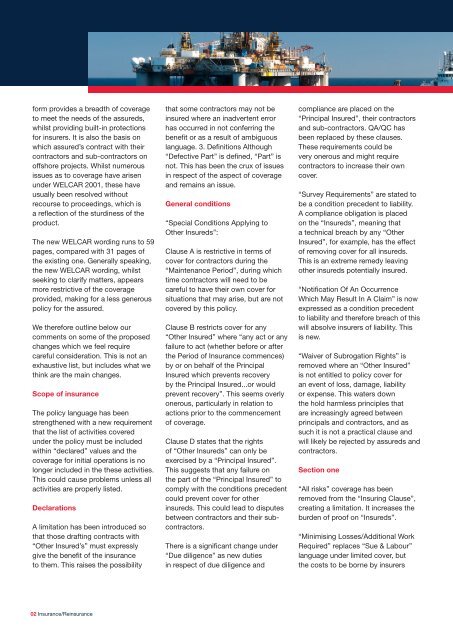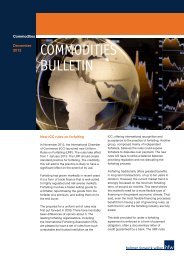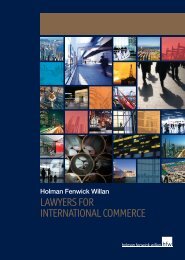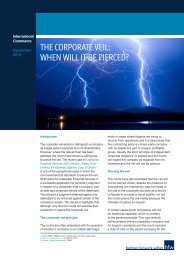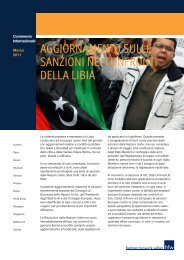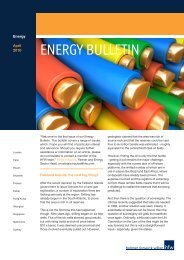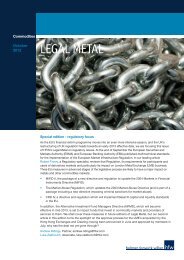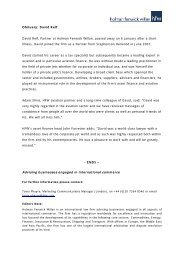You also want an ePaper? Increase the reach of your titles
YUMPU automatically turns print PDFs into web optimized ePapers that Google loves.
form provides a breadth of coverage<br />
to meet the needs of the <strong>as</strong>sureds,<br />
whilst providing built-in protections<br />
for insurers. It is also the b<strong>as</strong>is on<br />
which <strong>as</strong>sured’s contract with their<br />
contractors and sub-contractors on<br />
offshore projects. Whilst numerous<br />
issues <strong>as</strong> to coverage have arisen<br />
under WELCAR 2001, these have<br />
usually been resolved without<br />
recourse to proceedings, which is<br />
a reflection of the sturdiness of the<br />
product.<br />
The new WELCAR wording runs to 59<br />
pages, compared with 31 pages of<br />
the existing one. Generally speaking,<br />
the new WELCAR wording, whilst<br />
seeking to clarify matters, appears<br />
more restrictive of the coverage<br />
provided, making for a less generous<br />
policy for the <strong>as</strong>sured.<br />
We therefore outline below our<br />
comments on some of the proposed<br />
changes which we feel require<br />
careful consideration. This is not an<br />
exhaustive list, but includes what we<br />
think are the main changes.<br />
Scope of insurance<br />
The policy language h<strong>as</strong> been<br />
strengthened with a new requirement<br />
that the list of activities covered<br />
under the policy must be included<br />
within “declared” values and the<br />
coverage for initial operations is no<br />
longer included in the these activities.<br />
This could cause problems unless all<br />
activities are properly listed.<br />
Declarations<br />
A limitation h<strong>as</strong> been introduced so<br />
that those drafting contracts with<br />
“Other Insured’s” must expressly<br />
give the benefit of the insurance<br />
to them. This raises the possibility<br />
that some contractors may not be<br />
insured where an inadvertent error<br />
h<strong>as</strong> occurred in not conferring the<br />
benefit or <strong>as</strong> a result of ambiguous<br />
language. 3. Definitions Although<br />
“Defective Part” is defined, “Part” is<br />
not. This h<strong>as</strong> been the crux of issues<br />
in respect of the <strong>as</strong>pect of coverage<br />
and remains an issue.<br />
General conditions<br />
“Special Conditions Applying to<br />
Other Insureds”:<br />
Clause A is restrictive in terms of<br />
cover for contractors during the<br />
“Maintenance Period”, during which<br />
time contractors will need to be<br />
careful to have their own cover for<br />
situations that may arise, but are not<br />
covered by this policy.<br />
Clause B restricts cover for any<br />
“Other Insured” where “any act or any<br />
failure to act (whether before or after<br />
the Period of Insurance commences)<br />
by or on behalf of the Principal<br />
Insured which prevents recovery<br />
by the Principal Insured...or would<br />
prevent recovery”. This seems overly<br />
onerous, particularly in relation to<br />
actions prior to the commencement<br />
of coverage.<br />
Clause D states that the rights<br />
of “Other Insureds” can only be<br />
exercised by a “Principal Insured”.<br />
This suggests that any failure on<br />
the part of the “Principal Insured” to<br />
comply with the conditions precedent<br />
could prevent cover for other<br />
insureds. This could lead to disputes<br />
between contractors and their subcontractors.<br />
There is a significant change under<br />
“Due diligence” <strong>as</strong> new duties<br />
in respect of due diligence and<br />
compliance are placed on the<br />
“Principal Insured”, their contractors<br />
and sub-contractors. QA/QC h<strong>as</strong><br />
been replaced by these clauses.<br />
These requirements could be<br />
very onerous and might require<br />
contractors to incre<strong>as</strong>e their own<br />
cover.<br />
“Survey Requirements” are stated to<br />
be a condition precedent to liability.<br />
A compliance obligation is placed<br />
on the “Insureds”, meaning that<br />
a technical breach by any “Other<br />
Insured”, for example, h<strong>as</strong> the effect<br />
of removing cover for all insureds.<br />
This is an extreme remedy leaving<br />
other insureds potentially insured.<br />
“Notification Of An Occurrence<br />
Which May Result In A Claim” is now<br />
expressed <strong>as</strong> a condition precedent<br />
to liability and therefore breach of this<br />
will absolve insurers of liability. This<br />
is new.<br />
“Waiver of Subrogation Rights” is<br />
removed where an “Other Insured”<br />
is not entitled to policy cover for<br />
an event of loss, damage, liability<br />
or expense. This waters down<br />
the hold harmless principles that<br />
are incre<strong>as</strong>ingly agreed between<br />
principals and contractors, and <strong>as</strong><br />
such it is not a practical clause and<br />
will likely be rejected by <strong>as</strong>sureds and<br />
contractors.<br />
Section one<br />
“All risks” coverage h<strong>as</strong> been<br />
removed from the “Insuring Clause”,<br />
creating a limitation. It incre<strong>as</strong>es the<br />
burden of proof on “Insureds”.<br />
“Minimising Losses/Additional Work<br />
Required” replaces “Sue & Labour”<br />
language under limited cover, but<br />
the costs to be borne by insurers<br />
02 Insurance/Reinsurance


